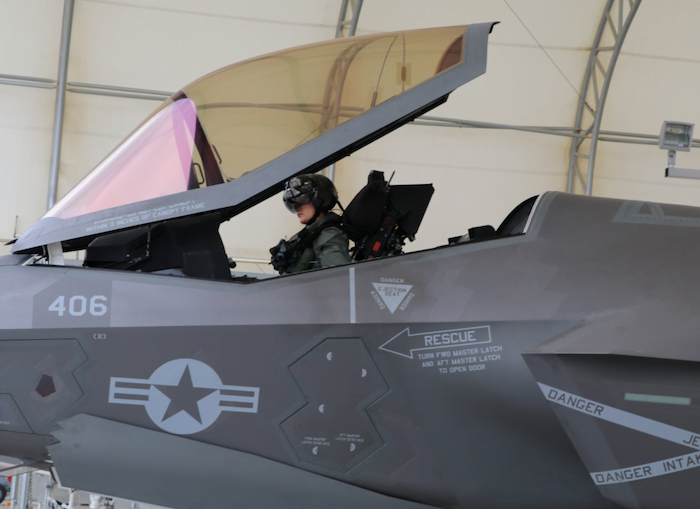On April 18, the U.S. Navy’s Strike Fighter Squadron VFA-147 ‘Argonauts,’ completed its first F-35C flight at Naval Air Station (NAS) Lemoore, Calif.
The inaugural flight supports the squadron’s transition from the F/A-18E Super Hornet to the F-35C, marking a significant step forward in the integration of the F-35C weapons system into the Navy’s arsenal.
In an article written by Mark D. Faram and published on April 4, 2018, the process was highlighted.
While the Navy’s two Joint Strike Fighter training squadrons tested their sea legs in the Atlantic in March, the future of the Navy’s operations was getting underway in earnest at Naval Air Station, Lemoore, California.
The Argonauts of Strike Fighter Squadron 147 technically began the transition to the F-35 in December after landing back at Lemoore following a six-month deployment aboard the carrier Nimitz as part of Carrier Air Wing 11.
“That was the final time they flew in the Super Hornet and their maintainers and pilots have now been training, both down at Eglin Air Force Base, as well as in Lemoore with the [Replacement Squadron], VFA-125,” said Cmdr. Ron Flanders, spokesman for Naval Air Forces in San Diego.
The Navy’s transition to the F-35C Lightning II — coupled with the U.S. military’s shift to the Pacific — is helping to turn this somewhat remote air station into the largest strike fighter hub in the Navy.
“Pilots have been going to training in the full-mission simulators in Lemoore and we anticipate them being certified as safe for flight later this year,” he said.
Despite the wait, “they are officially considered an operational squadron, the Navy’s first and only operational F-35C squadron.”
Navy officials are targeting October as a ready date for VFA-147, which will be receiving aircraft from the Roughriders of VFA-125, as well from the factory.
“The Navy understands that the threshold and objective dates, August 2018 and February 2019, are at risk due to a delay in the schedule,” said Lt. Cmdr. Leslie Hubbell, spokeswoman for Naval Air Forces.
“Once full capability has been demonstrated, and all other IOC criteria have been met, the Navy will declare that the F-35C has achieved Initial Operational Capability.”
It’s a major step in the Navy’s journey to get the Joint Strike Fighter into carrier air wings, currently slated to happen in February 2019.
The next step for the Argonauts will be to start more intensive flying as they begin their integration into a carrier air wing, a process that will include preparation for deployment on the aircraft carrier Carl Vinson in 2021.
What remains unclear, though, is who will come after VFA-147 in the transition to the F-35C.
The Navy has not yet clarified how that continued transition will unfold.
But what is clear is that the Navy has an ambitious plan for the Joint Strike Fighter, with a goal of fielding 20 operational JSF squadrons by the early 2030s.
Executing that plan will most likely be the responsibility of a new joint strike fighter wing — based in Lemoore — that will debut in the near future.
That command’s mission will be to focus on building the Navy’s JSF capabilities and managing the transition of the squadrons that will be switching to the Navy’s newest fighter jet.
The featured photo shows Lt. Cmdr Mike “Waylon” Jennings and Lt. Dave “Strokes” Hinkle from the “Argonauts” #VFA147 prepareingfor their first flight with the #F35C Lightning II at NAS Lemoore.
They are the first aviators from a U.S. Navy operational squadron to fly the aircraft.


